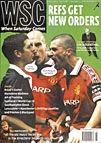 What do you do when you stop being the world's best player? Diego Maradona still hasn't come up with a satisfactory answer, as Martin Gambarotta reports
What do you do when you stop being the world's best player? Diego Maradona still hasn't come up with a satisfactory answer, as Martin Gambarotta reports
Of all the visits Diego Maradona received while ailing with a faulty heart in a private clinic in Buenos Aires, one stood out for its symbolism and could well have a place in local football lore in the future. The visit lasted 15 minutes. Enough time for an 18-year-old boy by the name of Javier Saviola to drop his national team shirt at the feet of Diego’s hospital bed. Saviola, River Plate’s new sensation, had just ended the season as the league’s top scorer. Only one other player had accomplished a similar feat when he was younger: Diego Maradona.
Maradona, who throughout the year had poured praise on Saviola (who, in truth, is more Argentina’s answer to Romario than a new Diego), appreciated the gesture. The next day, when he popped his head out of the clinic window to wave to his fans, he was wearing Saviola’s shirt. It was a sign of the state Argentina’s football is in: the former king was wearing the shirt of his heir apparent. For since Maradona’s retirement, fans have done little else but wait for someone to replace him.
In fact, before he was rushed to hospital in Punta del Este, Uruguay, with an irregular heart beat, reportedly after a cocaine overdose, little attention was paid to Maradona, except to place more honours on the shoulders of what looked like a broken man. Before the end of the year Maradona had made a public appearance to be declared sportsman of the century by Argentina’s leading newspaper. His face was puffy, and when he took the stage to accept the award he was literally crying out for help.
One reporter who interviewed Maradona only days before he was rushed to hospital said that Diego broke into a sweat only seconds after stepping out of the pool. In the interview, Maradona complained that Argentina’s footballing world had forgotten about him. He was a legend, yes, but he was of no use now. “I am not allowed to train a team, I am banned in Argentina,” he told the sports daily Olé.
Once in hospital, overcoming what doctors described as a brush with death, things rapidly changed. Football Association head Julio Grondona diplomatically declared that if Maradona kicked his cocaine habit he would be invited to train Argentina’s youth teams. Former President Carlos Menem, on holiday in Punta del Este, was one of the first to visit. He had his reasons. The night Menem’s Peronists were walloped at the polls the president, who was not seeking re-election, had Diego over at the presidential palace for pizza and champagne. The new president, Fernando de la Rúa, who won the election boasting that “they say I’m boring”, was reported to have little interest in being associated with the flamboyant style of either Menem or Maradona.
The lack of attention was eating at Diego’s heart. “Maradona is addicted to success,” wrote acclaimed Uruguayan author Eduardo Galeano. And to money, it could be added. At three in the morning, in the inner gardens of the clinic in Buenos Aires where Maradona was meant to be under strict surveillance, he faced the cameras for the first time since his seizure.
Fox Sports America, a Latin American cable channel, reportedly paid $60,000 for the interview. Even before Maradona’s manager Guillermo Coppola sold the story there had been speculation that Diego’s bank account was not in great shape. The rumours included talk that Maradona, out of work and spending heavily on drugs, food and booze, was already biting into the small fortune he had set aside for his daughters, Dalma and Giannina. One magazine estimated that by the time Maradona landed in Cuba to treat his drug problem, he had managed to make $600,000 out of the story of his sickness.
The public and the press laid most of the blame for the mess their hero was in on his inner circle, headed by Coppola, a silver-haired former bank clerk in his fifties. Few spoke in public about Diego’s entourage. But one of Maradona’s nephews broke the silence: “Diego is crazy and all his entourage does is ask for money and sell him drugs,” he said. Doctors at the respectable private clinic were close to a nervous breakdown. “Those who come to the clinic should not he shouting ‘come on Diego’, they should be screaming ‘damned cocaine!’” the clinic’s director declared.
And so the De la Rúa administration went into action and Maradona’s plight, which for at least a year had been relegated to the back pages of glossy magazines, turned into a state affair once again. The government pasted “Damned cocaine” posters all over Buenos Aires. The move came on the same day De la Rúa met Maradona’s daughters. In less than a day the government provided new passports so that the girls could join dad Diego and mum Claudia in Cuba. A picture of the new president talking to Dalma and Giannina was released to the press.
In Havana, with the eyes of the nation once again monitoring his every move, Maradona declared he dreamt of only one visit: that of national team coach Marcelo Bielsa.
From WSC 157 March 2000. What was happening this month